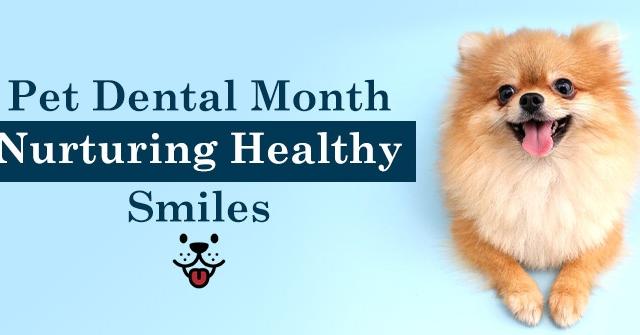When it comes to our pets, we often focus on their wagging tails, adorable antics, and cuddly companionship. However, one crucial aspect of their well-being that tends to be overlooked is dental health. Just like humans, our furry friends can suffer from dental issues that can lead to discomfort, pain, infection and even serious health problems if left untreated.
Our pets rely on their teeth not only for eating but also for play, grooming, and social interactions. Neglecting their oral health can lead to problems like tooth decay, gum disease, and bad breath. Moreover, untreated dental issues can result in systemic health problems affecting vital organs such as the heart, liver, and kidneys. To ensure the well-being of our pets, it’s crucial to prioritize their dental health.
At-Home Dental Care for Pets
As responsible pet owners, we can take proactive steps to maintain our pets’ oral health right at home. Regular brushing with a pet-specific toothbrush and toothpaste is an excellent place to start. While it may take some time for your pet to get used to the idea, patience and consistency can go a long way. Additionally, dental chews and toys designed to promote oral hygiene can help reduce plaque and tartar buildup.
Diet plays a significant role in dental health as well. Choosing high-quality pet food that supports oral health, such as dental diet formulas, can make a difference. These foods are specially formulated to reduce tartar and plaque accumulation, ultimately preventing dental issues. Regular check-ups with your veterinarian are essential to catch any dental problems early. During these visits, your vet can assess your pet’s teeth and recommend professional dental services when needed.
The Role of Veterinary Dental Clinics
When at-home care isn’t enough or if your pet already has dental issues, the next step is seeking the expertise of a veterinary dental clinic. These specialized clinics are equipped with the knowledge, skills, and equipment needed to provide comprehensive dental care for your pets.
One of the key advantages of visiting a veterinary dental clinic is the availability of specialized tools and techniques. Veterinarians at these clinics can perform dental cleanings, extractions, and oral surgery when necessary. They can also take dental X-rays to get a complete picture of your pet’s oral health, identifying hidden problems that might not be visible during a routine check-up.
What to Expect at a Veterinary Dental Clinic
Visiting a veterinary dental clinic for the first time can be a bit intimidating, but understanding what to expect can help ease any concerns. Here’s an overview of what typically happens during a visit to a veterinary dental clinic.
The veterinarian will begin by conducting a thorough examination of your pet’s mouth. This includes checking for signs of gum disease, loose or damaged teeth, and oral abnormalities. In many cases, the vet will recommend dental X-rays to assess the teeth and underlying structures. X-rays can reveal issues such as tooth root abscesses, fractures, or impacted teeth. If your pet’s teeth have significant plaque and tartar buildup, the vet will perform a dental cleaning and scaling. This process involves removing the accumulated debris from the teeth, both above and below the gumline.
Depending on the findings, the veterinarian may recommend various treatments, including extractions, fillings, or other procedures to address dental issues. These treatments are performed under anesthesia to ensure your pet’s comfort and safety. After the dental procedures, your pet will need some time to recover. The vet will provide instructions on post-procedure care, including any medications or dietary recommendations. Follow-up appointments may be scheduled to monitor your pet’s progress and ensure that the dental issues have been successfully addressed.
The Benefits of Veterinary Dental Services
Investing in veterinary dental services offers numerous benefits for both you and your pet. Improved overall health, better quality of life, prevention of systemic diseases, longevity, and even cost savings are the benefits you can expect.
Addressing dental issues can prevent more severe health problems down the line. By maintaining your pet’s oral health, you contribute to their overall well-being. Pets with healthy mouths are more comfortable, active, and happy. They can eat without pain, enjoy playtime, and engage in social interactions without the discomfort of dental problems. Dental disease can lead to systemic conditions, such as heart and kidney disease. By treating dental issues, you reduce the risk of these life-threatening complications. While professional dental services may seem like an investment in your animal’s health, they can save you money in the long run. Preventing dental issues or catching them early can spare you from costly emergency procedures and treatments.






